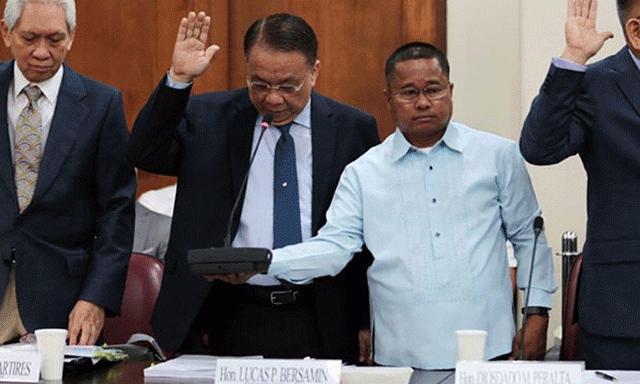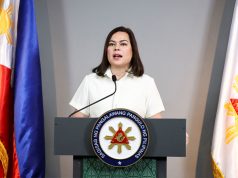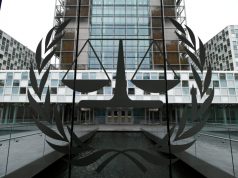
Questions were raised about the career and voting history of Associate Justice Lucas Bersamin, who according to media sources was selected by President Rodrigo Duterte to sit as the next Chief Justice of the Supreme Court on Wednesday.
The 69-year-old Bersamin was chosen from a shortlist that included Acting Chief Justice Antonio Carpio and Associate Justices Diosdado Peralta, Estela Perlas-Bernabe and Andres Reyes Jr, according to the source from inside the Palace.
He was the third most senior associate justice on the high court, after Carpio and Peralta, having been appointed by former president Gloria Macapagal-Arroyo in 2009.
Malacañang has yet to confirm the selection as of this writing.
Discussions about Bersamin’s reported appointment have centered about his selected despite being only the third-longest service magistrate on the high court.
The Palace comment setting aside seniority rule applied last vacancy proved a sign of things to come. “The #CJSearch is over. Lucas Bersamin, third senior associate justice, is the new Chief Justice of the Supreme Court.” …And so it came to pass. https://t.co/QI9gPNSVWw
— Manuel L. Quezon III (@mlq3) November 28, 2018
Others questioned his voting pattern in some recent high-profile decisions.
Duterte has chosen SC Justice Lucas Bersamin as new Chief Justice.
As associate justice, Bersamin voted in favor of Sereno's ouster, the late dictator Ferdinand Marcos' burial at the Heroes' Cemetery, and the Mindanao martial law declaration and extension, among others. ☕️ 💦 pic.twitter.com/mpFn3hmmCo
— Korte Supremo 👨🏻⚖️ (@KorteSupremo_) November 28, 2018
Meet Duterte’s new Chief Justice, Lucas Bersamin –
✔️ Put in SC by then Pres. Gloria Macapagal-Arroyo
✔️ Voted to oust ex-CJ Ma. Lourdes Sereno
✔️ Voted in favor of hero’s burial for late dictator Ferdinand Marcos
✔️ Voted in favor of Mindanao Martial Law & extension
— Arnold Padilla (@arnoldpadilla) November 28, 2018
Third most senior on shortlist
The selection of Bersamin in favor of two more senior justices came as a surprise to many after Duterte vowed that he would be following the so-called “seniority rule,” a tradition of selecting the longest-serving associate justice to sit in place of the vacant chief justice post.
After the mandatory retirement of former chief justice Teresita de Castro-Leonardo in October 2018, Carpio, who has been sitting on the high court since 2001, was widely believed to be the easy choice for chief magistrate.
Carpio, however, is known for butting heads with Duterte on the issue of the territorial dispute with China in the West Philippine Sea.
Days before Bersamin’s selection, the Palace said that Carpio’s stance would not be inimical to his bid to be the next chief justice.
Among those who reconciled Bersamin’s appointment with the seniority rule was Chief Public Attorney Persida Acosta, who said that Bersamin was actually more senior than Carpio as Bersamin was appointed trial court judge in 1986, more than a decade before Carpio entered the judiciary through his appointment to the Supreme Court in 2001.
32 years in the judiciary, but not most senior at SC
Bersamin graduated from the University of the East College of Law in 1973 and finished ninth in that year’s bar exam with a grade of 86.3 percent.
After working in private practice for 12 years, he was appointed as a regional trial court judge in 1986. In 2003, he was elevated to the Court of Appeals.
He is known to have been good friends with his fellow Supreme Court justice Peralta, even before they were appointed to the high court in 2009.
Voting history
He voted in some of the most high-profile and controversial cases decided on by the high court.
In July 2014, he voted in favor of declaring unconstitutional the Disbursement Acceleration Program of the administration of Benigno Aquino III.
He also voted in favor of ruling that former presidential candidate Sen. Grace Poe was a natural-born citizen of the Philippines in the election contest filed against her before the 2016 presidential race.
In July that year, he voted to junk the plunder case against Arroyo, explaining that the ombudsman had not presented enough evidence to prove she had amassed P366 million worth of Philippine Charity Sweepstakes Office funds as ill-gotten wealth.
He also voted to allow the burial of late dictator Ferdinand Marcos in the Libingan ng Mga Bayani that year, citing Marcos’ former position as a soldier and government official.
In May 2018, he was one of the eight associate justices who voted to remove Maria Lourdes Sereno as the chief justice in the quo warranto proceeding on her appointment.
Bersamin also penned the ruling that granted bail to former senator Juan Ponce Enrile, accused of plunder, citing humanitarian reasons. His opinion also sided with that of the Philippine Airlines in saying there was no illegal retrenchment of more than 1,000 flights attendants and stewards.









